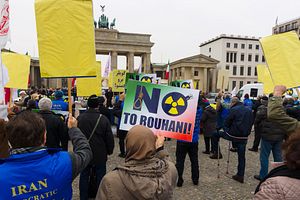It was recently announced that Italian Prime Minister Matteo Renzi is the latest Western senior official scheduled to visit Tehran, on April 12 and 13, where he will meet with Iranian President Hassan Rouhani and other key officials. This latest state visit comes only a few months after a high profile trip by Rouhani to Italy and France in January. It is part of a growing trend of diplomatic exchange between Iranian and European officials and business delegates, as the two sides eagerly pursue expanded trade relations following the suspension of U.S.-led sanctions.
However, although Renzi’s planned visit is in keeping with an ongoing pattern, it is out of sync with the recent protests that have followed Rouhani on every trip to Europe. The Iranian president’s visit to Paris brought him to the heart of Europe, where he faced major demonstrations that highlighted the misconception that Rouhani is a moderate within his own regime and a force for reconciliation between Iran and the West.
In Paris and Rome, and more recently in Vienna, Iranian opposition movement the National Council of resistance of Iran (NCRI) has been joined by a multitude of human rights groups that have drawn to attention the Rouhani administration’s worsening human rights record in the Islamic Republic of Iran.
The Iranian regime is clearly making every effort to re-establish trade ties with the European Union and its allies. Yet the regime makes no meaningful changes to its behavior at home and in the wider Middle East. As a result, the foreign protesters’ efforts to boost Europe’s scrutiny of Iran’s human rights record was so potent that the Rouhani government cancelled its plans to visit Vienna after Austrian authorities refused to prevent an NCRI demonstration from going forward.
The protest went ahead in Rouhani’s absence and the cancellation could be viewed as a victory for the protesters, as well.
Although Vienna did not deliberately rebuff Rouhani or adopt the protesters’ demands that any further expansion in Iranian-European relations be predicated on human rights reforms, the Austrian government did at least make it clear that it will not be a party to Iran’s attempt to export its own repressive environment to European democracies.
Austrian President Heinz Fischer rightly criticized Tehran’s request for a crackdown on protests, noting that Austria had taken all necessary security precautions and declared, “The right to assembly is deeply rooted in the Austrian constitution… Assembly cannot be prohibited in our democracy.”
Unfortunately, this sort of response falls far short of properly acknowledging the concerns of protesters who have made every effort to shame the European Union for unconditionally granting an audience to a government that is one of the worst violators of human rights in the world and a one of leading state sponsors of terrorism.
The announcement of Renzi’s trip so soon after the cancellation in Austria sends a message of appeasement to the Iranian regime.
Austria should be applauded for standing up to Iran’s attempts to export repression. Hopefully, other European governments will show similar backbone in the future. Given though the well-documented pervasiveness of Iranian repression, it is not sufficient for Europeans however to rebuff it at home and then allow it to continue unchecked on Iranian soil in the midst of ongoing, deferent state visits.
It is hard to see Rouhani’s cancellation of his visit to Austria as anything other than a reaction to the shame that his government would experience at having some of their worst deeds exposed. Yet the regime should not be permitted to hide from that shame. If Renzi and other European heads of state continue to insist upon visiting Tehran, the onus is on them to put pressure on Tehran publicly and vociferously to move ahead with the reforms that Rouhani promised when he was elected as a “moderate” and at present, has never delivered upon.
If Rouhani would not come to Europe to be scrutinized on his human rights record, he will not allow it to happen at home, either. If the Iranian regime does not fully address its human rights record, it should let Iran go into global isolation until it has truly earned full-scale trade and diplomatic relations with the world community.
As Fischer noted, and as Renzi will no doubt agree, a democratic country cannot permit any curtailment of human rights. That principle ought to apply to the Iranian people as well as to Europeans, and it ought to never be subject to compromise, even when there is economic incentive to ignore repression and violence.
Sir David Amess, Conservative MP for Southend West and co-chair of the British Parliamentary Committee for Iran Freedom (BPCIF), www.iran-freedom.org

































